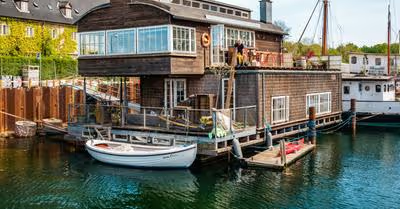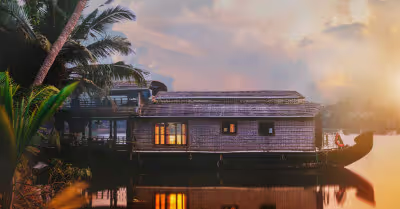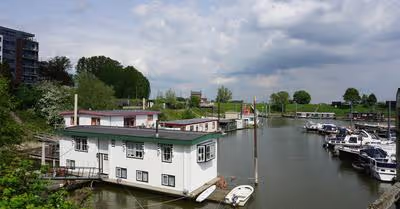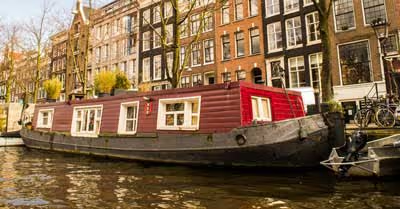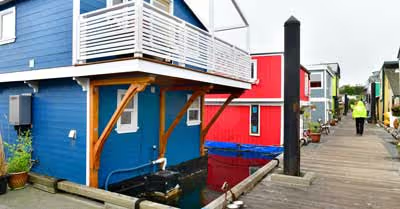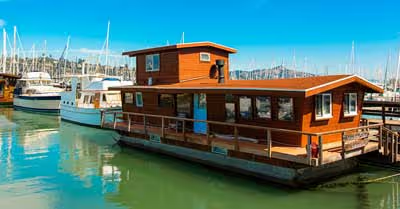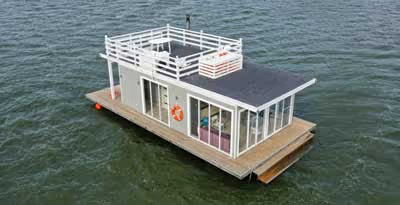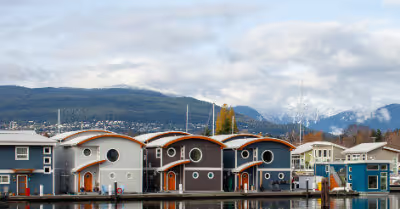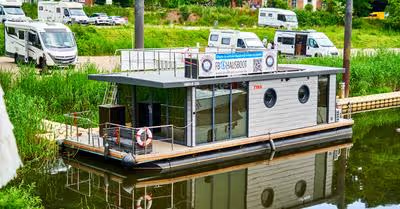
Key Takeaways
- Houseboats serve as unique vacation rentals and full-time residences.
- Houseboat communities foster strong social bonds.
- Innovative floating architecture and design maximize limited space.
- Houseboats contribute to niche tourism and travel experiences.
- They offer eco-friendly activities that enhance environmental sustainability.
Houseboats have always intrigued boaters with their distinct charm. But how do you put them to use beyond the typical leisure and living scenarios?
Houseboats are used as permanent residences, vacation homes, floating restaurants, and party venues. They can be used as short-term rentals, art studios, and educational tour venues. Houseboats are also ideal for river cruises, adventure sports, and hotel and spa facilities.
As a boating expert, I have a comprehensive understanding of the various types of houseboats, their construction, maintenance, and how they are utilized in different settings. My expertise enables me to provide valuable insights, practical tips, and uses of houseboats. So, let's dive in and explore the fascinating world of houseboat living.
How are Houseboat Used
Over the years, I've seen the various ways in which people use houseboats and yachts to enhance their living experiences and recreational activities. Houseboats have gained immense popularity among people opting for unique living spaces and alternative vacation experiences.
The following table summarizes the different uses of houseboats.
Permanent Residence
One of the most common uses for houseboats is as a permanent residence. We often hear about cruising houseboats, but there are many non-cruising houseboats and floating homes that provide a unique, comfortable, and mobile living space.
In terms of living quarters, houseboats can have all the amenities that one finds in a land-based home. The living space in a houseboat includes bedrooms, bathrooms, a kitchen, and a living room.
The layout varies widely depending on the design and size of the houseboat, but one thing to consider is the efficient use of space since it is often limited compared to land homes.
Safety is also an important aspect of living on a houseboat. Always ensure that your boat is well-equipped to handle inner waters and potential risks from the natural elements.
Vacation Homes
When thinking about vacation homes, one of the most unique options that comes to mind is houseboats. They offer a refreshing alternative to more traditional hotels or rental properties, as they have the added feature of being on the open water.
Using houseboats as vacation homes provides an opportunity for fun-filled recreation, immersing in picturesque surroundings, and partaking in various water-based activities.
A non-cruising houseboat is an excellent choice for a vacation home because it remains stationary during stays. It’s particularly convenient for extended trips since they provide a stable base that offers an unparalleled sense of relaxation.
Many of these non-cruising houseboats come with all the amenities of a traditional home, making the stay even more comfortable.
Some of the major advantages of houseboat vacation homes include:
- Unique experience
- Close proximity to water activities
- Community living
- Flexibility
If you’re planning a vacation and looking for some great houseboat ideas, you can take a look at these amazing houseboat rentals to help your search.
Floating Restaurants
In recent years, there has been a growing trend of converting houseboats into floating restaurants. With a unique dining experience and the opportunity to relax on the water, these floating restaurants have become quite popular in different parts of the world.
One of the important aspects of a floating restaurant is finding the right boat to use. Typically, houseboats are the preferred option, as they are designed to accommodate people and provide a comfortable living space. Converted houseboats often retain many of the original features, ensuring an authentic experience for diners.
Here are a few surefire ways to make a floating restaurant experience unforgettable:
- Location: Find a picturesque spot with beautiful views and moor the houseboat in a secure area.
- Interior Design: Transform the inside of the boat into a cozy, welcoming environment for guests.
- Menu: Offer a range of dishes, using fresh local ingredients whenever possible, and cater to various dietary preferences and restrictions.
- Entertainment: Background music, live events, or even incorporating local culture can all make for a memorable night.
If you’re looking for some great ideas to turn your houseboat into a floating restaurant, you can find some unique insights from this online community.
Fishing Purposes
I have noticed that many people use houseboats for fishing purposes. Houseboats provide a unique and convenient way to enjoy the various fishing opportunities available on the water. Houseboats can be used on an ocean, a lake, or a river, and they tend to be an excellent option for fishing enthusiasts.
One significant advantage of using a houseboat for fishing is the mobility it offers. Houseboats can easily navigate to different fishing spots, providing access to different types of fish in various habitats, as shown in this video.
The houseboats generally come with floats or rafts that can be used for fishing while the boat is anchored. This allows anglers to fish from a stable platform without having to worry about the boat's constant movement.
Houseboats can also be equipped with storage compartments and built-in bait wells, making it easy to organize and store fishing gear. In some houseboats, the living space can be converted into a cleaning and storage space for fish, ensuring that the angler can enjoy a clutter-free environment.
The convenience of having a houseboat is not limited to the fishing experience alone. There are plenty of benefits when it comes to relaxation and enjoyment.
After a day of fishing, you can retreat to the comfort of your houseboat, cook your catch, and unwind while enjoying the views. This way, you don't need to worry about finding a place to stay or rent while you're on a fishing trip. That being said, here are some top houseboat fishing trip locations.
Short-term Rentals
Houseboats are popular short-term rentals, as they provide a unique vacation experience. This alternative lodging option allows people to enjoy living on the water, with various types of houseboats available for rent.
From a stationary barge to a motorized vessel and even a luxury yacht, these floating homes offer a refreshing change for vacationers.
When renting a houseboat, it's essential to know the price of a houseboat rental and find a suitable mooring location, such as a marina, where you can easily access the necessary amenities, like water and electricity.
Keep in mind that the size and style of houseboats vary significantly, but most can comfortably sleep up to 8 people. Selecting the right size depends on the number of occupants and the desired level of comfort.
Larger houseboats typically offer private bedrooms and additional amenities like sun decks for sunbathing or fishing, whereas smaller boats provide a more intimate setting. Also, consult the houseboat owner about the operation cost and any other expenses involved. You should also consider where to rent a houseboat.
River Cruises
Houseboats are commonly used for leisurely trips along rivers and inland lakes. They offer a unique experience that combines the comfort of a home with the adventure of exploring new places.
One of the benefits of river cruises on houseboats is the ability to explore the natural beauty of the river and its surroundings at your own pace. Along the way, you can visit quaint towns and historic sites, sample local cuisine, or simply relax and appreciate the tranquil environment.
It's important to note that when using a houseboat for river cruising, you need to be mindful of the rules and regulations set by the local river trust. They are responsible for overseeing the waterways, ensuring their cleanliness, and providing various services such as waste disposal and mooring spots for boaters.
Also, note that navigating a houseboat requires some skill, but it's generally not a difficult task for those who are used to operating boats. However, if you're a beginner, you might consider taking a short course or hiring a skipper to ensure a smooth and enjoyable journey.
Party Venues
I appreciate the unique opportunities these vessels offer as party venues. Houseboats provide a memorable and entertaining atmosphere for hosting events, from casual gatherings to lavish celebrations.
One of the most significant benefits of hosting a party on a houseboat is the stunning and ever-changing backdrop. When you choose a picturesque marina or idyllic waterway to dock your houseboat, your guests enjoy breathtaking views and a refreshing change of scenery.
Another advantage of houseboats is their versatility in accommodating various event styles. From intimate gatherings to larger celebrations, you can easily cater to your guests' needs by renting an appropriately sized houseboat.
Sailing a houseboat during a party can also contribute to the event's overall appeal. If you opt for a leisurely cruise along a canal or lake, your guests can enjoy the journey while taking in the sights and sounds of the surrounding environment.
Plus, sailing offers the opportunity to access secluded spots, perfect for a private and exclusive celebration.
If you’re planning an intimate event or a party on a houseboat, here are some great ideas on how to do it.
Adventure Sports
When it comes to houseboats, many people might think of them as just a place for relaxation and leisure. However, houseboats can also serve as an excellent base for a variety of water-based sports and activities.
One popular adventure sport that can be enjoyed on a houseboat is sailing. With the houseboat serving as your home base, you can easily store and access your sailing gear and equipment. Once you're ready, simply launch your sailboat from the houseboat's floats and set off to enjoy the open sea.
Aside from sailing, renting a houseboat also offers the opportunity to participate in other adventure sports. Activities such as boating, swimming, and kayaking are all possible when you have a houseboat as your base. The convenience of having everything you need in one place makes it much easier to enjoy these sports.
If you're looking for a more laid-back water activity, I highly recommend trying some fishing using these amazing tips. While fishing might not have the same adrenaline rush as some of the other sports I've mentioned, there's still a sense of excitement and challenge to be found in reeling in a big catch.
Hotel and Spa Facilities
One popular use for houseboats is to transform them into floating hotels and spa facilities. By doing this, businesses can provide a unique and relaxing environment for their guests.
Floating hotels or "botels" are typically located in marinas, which offer convenient access to both land-based and water-based activities for guests. Many floating hotels have a varied range of amenities, from basic accommodations to more luxurious offerings such as on-board spa treatments and gourmet dining.
Guests often opt for renting a floating hotel room for a unique vacation experience, disconnecting from the bustling city life. In many cases, these floating hotels attract tourists seeking recreational activities like fishing, swimming, or simply lounging on deck while enjoying the beautiful scenery.
Also, some houseboats cater to wellness-focused clientele, providing exclusive spa services on the water. The spa services on a houseboat include a sauna, powder room, and shower area, among others.
A floating spa can take advantage of the calming effect of water to create an idyllic environment for treatments, making it an attractive option for those seeking relaxation and rejuvenation. So if you’re thinking of using a houseboat as a spa facility, here are some great tips to kick-start this amazing journey.
Community Living
In recent years, I’ve witnessed an increasing number of people embracing community living on houseboats and floating houses in different areas. A shift towards a more sustainable and minimalistic way of life has contributed to this growing trend.
Houseboats and floating homes are often moored together in clusters, fostering a unique atmosphere where neighbors interact regularly. This camaraderie is further amplified by communal spaces that can be found in some houseboat communities, such as river trust gardens or shared docks.
One thing that’s particularly intriguing about houseboat communities is the architectural variety. The homes can range from small, cozy boats to larger, luxurious vessels with multiple bedrooms and modern amenities.
A floating home offers a similar degree of variety, with some being built on land and later floated to their mooring site. This mix of styles and sizes further contributes to the charm of these communities. You can also join this community forum for more insights on community living in houseboats.
Art Studios
Recently, houseboats have evolved beyond just being floating homes; they are now serving as unique art studios for liveaboard artists. The combination of a serene environment, constantly changing surroundings, and closeness to nature provides an inspiring space for artists to work and explore their creativity.
One interesting project I came across was the 2Boats project, where two artists embarked on a voyage through Europe's waterways on their self-built motorized houseboats.
These floating art studios not only offered them a workspace but also housed their collections of fine art, photography, and other art forms. The tranquility of the water, combined with access to various locations, attracted other artists to connect and collaborate with them.
Another fascinating example is the Studio Drop, a tiny off-grid studio designed for artists inspired by ancient boat-building techniques. It features wooden panels that encase its interior, providing a cozy atmosphere to work in, and a hammock daybed woven from a trawler net for relaxation.
Educational Tour Venues
Houseboats are multi-use vessels and can be ideal educational tour venues on rivers and inland waterways. I’ve seen situations where schools organize trips to spend time on houseboats to learn more about the unique living concepts and rich history of these floating homes.
When planning an educational tour on a houseboat, first consider the destination. Houseboats are popular in many countries around the world and provide a diverse range of river-based educational opportunities.
Students can visit places like the backwaters of Kerala in India, take a trip down the South Coast of San Fransisco, or explore the bayous of Louisiana. The choice of location ultimately depends on the curriculum, budget, and learning objectives.
Houseboat tours can teach students several important subjects. For example, they can learn about the local flora, fauna, and ecosystems present in the river and surrounding land.
Additionally, house boat tours offer insights into the culture and history of the people living along the rivers, helping students develop empathy and understanding for different ways of life.
To ensure your students get the most out of the experience, choose a houseboat that can provide utilities such as ample space and comfortable accommodations. It's important for the children to be safe. Here are some safety tips to embrace during an educational houseboat trip with children.
Greening the Waves: Sustainable Practices in Houseboat Communities
As a houseboat enthusiast, I've witnessed the numerous advantages such alternative living arrangements bring to our environment. A floating house provides a unique and close relationship with nature and promotes sustainable living.
Let’s delve into the fascinating world of houseboat communities and their innovative sustainability practices.
Floating gardens are gaining immense popularity among houseboaters. Utilizing their limited rooftop space or designing floating platforms, these gardeners manage to grow vegetables, fruits, and herbs, reducing their reliance on conventional agriculture.
This approach minimizes water usage, contributes to cleaner air, and improves overall self-sufficiency.
Aquaculture (or fish farming) is another interesting sustainability practice observed in houseboat communities. By cultivating aquatic plants and rearing fish in nearby water, they create a self-sustaining food source, reducing their dependence on traditional markets.
Furthermore, aquaculture can improve water quality by absorbing excess nutrients and providing an eco-friendly solution to feed the community.
Houseboat communities also prioritize eco-friendly waste management systems. Most houseboats are equipped with composting toilets, which transform human waste into valuable fertilizer for their floating gardens and beyond.
Additionally, green waste-management systems like biodigesters help convert food waste into biogas and nutrient-rich sludge, contributing to clean energy production and organic fertilizer availability.



